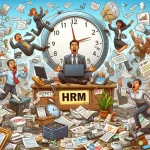In today’s rapidly evolving business landscape, the integration of Artificial Intelligence (AI) into Human Resource Management (HRM) is transforming the way organizations manage their workforce. AI-powered HRM systems are revolutionizing recruitment, employee engagement, performance management, and many other aspects of HR. This blog explores the functionalities of AI in HRM and how it is reshaping the future of work.
Recruitment and Talent Acquisition
One of the most significant impacts of AI in HRM is seen in recruitment and talent acquisition. Traditional recruitment processes are often time-consuming and prone to bias. AI-driven recruitment tools can:
- Automate Resume Screening: AI algorithms can quickly sift through thousands of resumes, identifying the most suitable candidates based on predefined criteria. This significantly reduces the time and effort required for initial screening.
- Enhance Candidate Matching: By analyzing data from successful hires, AI can improve the matching of candidates to job descriptions, ensuring a better fit for the role and the company culture.
- Reduce Bias: AI can be programmed to disregard demographic information, focusing solely on skills and experience. This helps in promoting diversity and inclusion within the organization.
- Predictive Analytics: AI can predict candidate success and tenure by analyzing historical data and identifying patterns. This helps in making more informed hiring decisions.
Employee Engagement and Experience
Employee engagement is crucial for retaining top talent and maintaining a productive workforce. AI tools can enhance employee engagement in various ways:
- Personalized Onboarding: AI can create personalized onboarding experiences for new hires, providing them with tailored information and resources based on their role and preferences.
- Sentiment Analysis: AI-powered sentiment analysis tools can gauge employee sentiment by analyzing communication patterns, feedback, and surveys. This helps HR teams identify potential issues and address them proactively.
- Chatbots and Virtual Assistants: AI chatbots can provide instant answers to employee queries, guide them through HR processes, and even assist with career development planning. This improves employee satisfaction and reduces the workload on HR teams.
- Employee Development: AI can recommend personalized learning and development programs based on individual performance data and career aspirations. This fosters continuous growth and skill enhancement among employees.
Performance Management
AI is also transforming performance management by making it more data-driven and objective:
- Continuous Feedback: AI-powered platforms can facilitate continuous feedback between employees and managers, moving away from traditional annual reviews. This ensures real-time recognition and constructive feedback.
- Goal Setting and Tracking: AI can help set realistic and achievable goals by analyzing past performance data. It can also track progress and provide insights into areas needing improvement.
- Bias Reduction in Evaluations: AI can analyze performance data objectively, reducing the risk of bias in performance evaluations and ensuring fairness in appraisals and promotions.
- Predictive Performance Analytics: AI can identify patterns and predict future performance trends, helping managers to proactively address potential issues and support high performers.
Workforce Analytics and Planning
AI enables HR departments to leverage data for strategic workforce planning:
- Predictive Workforce Planning: AI can forecast workforce needs based on business trends and historical data, helping HR teams plan for future hiring, training, and development needs.
- Attrition Prediction: By analyzing factors such as job satisfaction, engagement levels, and external market conditions, AI can predict which employees are at risk of leaving. This allows HR to take preemptive measures to retain talent.
- Diversity and Inclusion Analytics: AI can provide insights into diversity and inclusion metrics, helping organizations identify gaps and implement strategies to promote a more inclusive workplace.
- Optimized Resource Allocation: AI can analyze workloads and resource utilization, ensuring optimal allocation of human resources across projects and departments.
The integration of AI into HRM is not just a trend but a significant shift towards more efficient, data-driven, and employee-centric HR practices. By automating routine tasks, providing deeper insights, and enhancing the overall employee experience, AI is empowering HR professionals to focus on strategic initiatives that drive business success. As AI continues to evolve, its impact on HRM will only grow, making it an indispensable tool for organizations aiming to thrive in the competitive business environment.
Embracing AI in HRM is a journey that requires careful planning, continuous learning, and a commitment to leveraging technology for the betterment of both the organization and its employees. The future of HRM is here, and it’s powered by AI.





